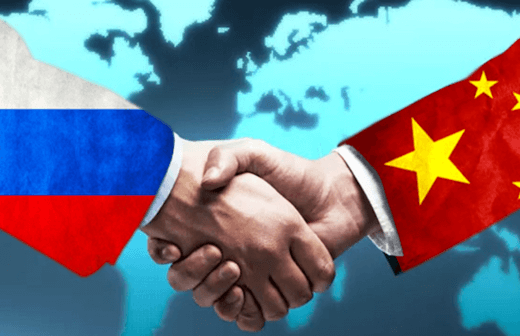1) Diplomatically
Under Chinese President Xi Jinping and his Russian counterpart Vladimir Putin, Beijing and Moscow have grown increasingly close. In early February, they met to discuss their anti-U.S. alignment, confirming that both nations shared "no limits" to their national interests. This meeting was held during the military build-up on Russia’s border with Ukraine. Western espionage reports said that China had asked Russia to wait to invade Ukraine until after the Beijing Olympics ended later that month. Simultaneously, China not only refused to condemn the invasion of Ukraine, but either abstained or sided with Russia in multiple U.N. resolutions regarding the war. Russia also added Taiwan to their list of foreign states and territories that commit "unfriendly actions" against its military invasion of Ukraine, despite Russia recognizing Taiwan as a part of China. Xi Jinping has assured Putin of China's support on Russian “sovereignty and security” in May. Following Speaker of the House Nancy Pelosi’s trip to Taiwan in early August, Russia similarly backed China. Putin even drew parallels between U.S. support for Ukraine and Pelosi’s trip, describing them both as part of alleged efforts by Washington to foment global instability.
2) Militarily
Throughout the conflict in Ukraine, U.S. sources have claimed that China has sent weapons to Russia on multiple occasions, though both Russia and China deny these accusations. The accusations however, are not unfounded. Both nations have held an increasingly frequent number and more diverse range of bilateral and multilateral military exercises. These exercises have included a long-standing series of land drills and novel maritime maneuvers. Recent years have also seen joint aviation patrols in the Asia-Pacific region, Chinese participation in Russia’s annual strategic exercises, and command post exercises simulating combined missile defense tasks. Russia is holding its “Vostok (East) 2022” exercise, which is a series of war games in which China will also be participating. China released a statement regarding the exercise: “The aim is to deepen practical and friendly cooperation with the armies of participating countries, enhance the level of strategic collaboration among the participating parties, and strengthen the ability to respond to various security threats.”
3) Economic Cooperation
Days before Russia invaded Ukraine, they signed a deal with China that would supply 100 million tons of coal in the "coming years" to its southern neighbor. Russia state-owned news outlet TASS reported on the deal stating that Russia’s share of coal in the Asia-Pacific market has increased by 8 percent since 2010, with Russia now controlling around 12 percent of the market. When the U.S. and the E.U. imposed the SWIFT ban on Russia, Russian state media boosted the narrative that Russia-China financial relations can grow closer and that Russia might turn to China’s Cross-Border Interbank Payments (CIPS) messaging system, a SWIFT alternative. Some Chinese media also published commentary on the potential for Russia to use CIPS and work with Russia’s own messaging system, the SPFS. In April, Director General of European Affairs at China’s Foreign Ministry, Wang Lutong, held a press conference on the EU-China summit, saying China will continue normal trade with Russia as “China is not a related party on the crisis of Ukraine.” Early in August, Bloomberg reported that Chinese exports to Russia in July were valued at $6.7 billion, which is comparable to the level of Chinese exports to Russia from before the invasion of Ukraine. Bloomberg notes that some “Chinese goods are filling the niche left by the exodus of western brands,” particularly with vehicle sales from Chinese companies which now rank among Russia’s best-selling cars. Rising local Russian demand for Chinese currency has also driven RMB-ruble currency trade to its highest ever volume in July. In June, Russia became China’s largest oil supplier as Chinese state-owned petrochemical companies such as Sinopec and Zhenhua Oil increased purchases of cheap Russian crude oil. Russian oil sales to China have offset lost revenue from the decline in Western imports due to Western sanctions on Russia for its invasion of Ukraine. Chinese imports of Russian oil in May of 2022 had increased by 55 percent from the same month the previous year, after climbing just 4 percent year-on-year in April 2022.
4) Social Media and Propaganda
Two days before the invasion of Ukraine, Chinese media guidance, with detailed censorship instructions for reporting on the Russia-Ukraine conflict, were leaked by the news outlet Shimian. The guidance said not to post anything unfavorable to Russia or in favor of the West. That same day, the People’s Daily published a commentary alleging, “individual major powers have revived the Cold War mentality and created camp confrontation,” and the Chinese Foreign Minister Wang Yi spoke with U.S. Secretary of State Antony Blinken on the phone, saying that “the legitimate security concerns of any country must be respected… What has happened on the Ukraine issue has much to do with the long delay in the effective implementation of the Minsk II agreements,” referring to the ceasefire deal that Russia and Ukraine agreed to in February 2014. In March, the Chinese Foreign Ministry Spokesperson, Wang Wenbin, denied a report by the New York Times that senior Chinese officials told senior Russian officials not to invade Ukraine before the end of the 2022 Winter Olympics in Beijing, instead repeating the Russian propaganda that the “decision by the U.S. to expand NATO” led to this crisis.
5) Cyber
In April, the Times of London reported that China coordinated a large cyberattack on Ukrainian military and nuclear facilities prior to the Russian ground invasion. According to the Times reporting, the computer network exploitation attacks targeted over 600 Ukrainian websites, peaking on February 23, the day before Russia invaded Ukraine. A Security Service of Ukraine (SBU) colonel who spoke with the Times stated that the cyberattacks had characteristics unique to the tools and methods used by the cyberwarfare unit of the People’s Liberation Army. Later in June, the Chinese Foreign Ministry spokesperson, Zhao Lijian, asserted that by providing expertise to support Ukrainian cyber operations against Russia, the U.S. is “conducting a dangerous experiment in the context of the Russia-Ukraine conflict.” Ming Jinwei, senior editor at Xinhua News Agency according to The Washington Post, wrote in his WeChat blog about how his outlet needed to walk a tight line on its Ukraine coverage, noting that China “has to back Russia up with emotional and moral support… In the future, China will also need Russia’s understanding and support when wrestling with America to solve the Taiwan issue once and for all.”










